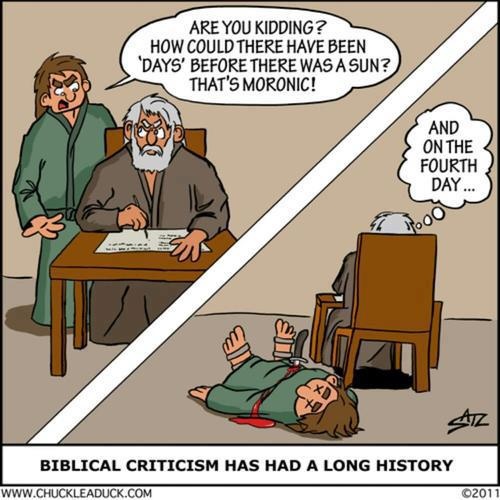I wonder whether the cartoonist is intentionally playing on the double meaning of “criticism”, or reflects the same confusion educators often encounter in classes. When we talk about “Biblical criticism” the phrase does not mean “criticizing the Bible” – it means the careful, thorough, detailed, scholarly study of the Bible. Such study can indeed lead one to ask questions and draw conclusions that could be considered “criticism” in the more popular sense. It is perfectly acceptable to ask whether the flow of the narrative in the Gospel of John is as smooth as it could be, and consider whether a different arrangement would represent an improvement – to give just one example.
But scholarly study of the Bible – Biblical criticism in that sense – is very different than the phenomenon one encounters widely on the internet of treating the Bible with a fundamentalist's wooden literalism, finding it absurd, and on that basis insulting the author. I could well imagine the scenario in the cartoon playing out differently, with a modern-day reader (whether a fundamentalist Christian or a formerly fundamentalist Christian turned atheist) saying the same thing as the critic in the cartoon. But the author gets a gleam in his eye and says, “Very good! Now can you figure out why I've put things in this order?” And a great conversation would ensue that gets at the text's structure, its parallelism, its layers of meaning missed by fundamentalist readers.
And that is what criticism in the sense of critical study is all about. Noticing the problems, but not merely viewing them as evidence of an author's foolishness (although sometimes that may be the best explanation), but considering other possible explanations. We cannot interview the author of an ancient text, but sometimes the text itself provides the clues we need, especially if the author was not an incompetent and perhaps even murderous hack, but a skilled composer.
How do you think the conversation in the cartoon would have unfolded, had it really happened? Has Biblical criticism (in the scholarly sense, or in either sense) shaped your answer to that question?













